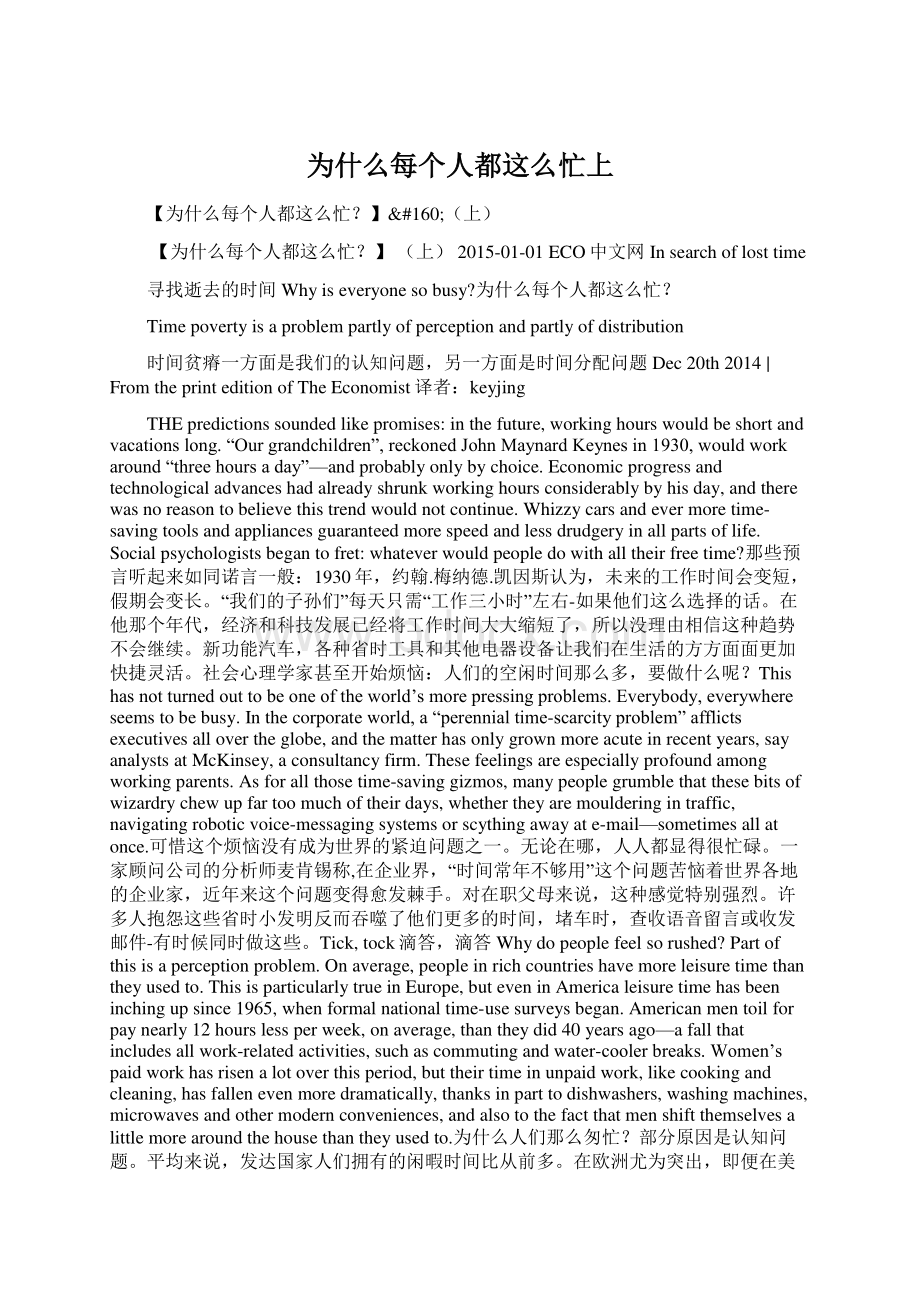为什么每个人都这么忙上.docx
《为什么每个人都这么忙上.docx》由会员分享,可在线阅读,更多相关《为什么每个人都这么忙上.docx(6页珍藏版)》请在冰豆网上搜索。

为什么每个人都这么忙上
【为什么每个人都这么忙?
】 (上)
【为什么每个人都这么忙?
】(上)2015-01-01ECO中文网Insearchoflosttime
寻找逝去的时间Whyiseveryonesobusy?
为什么每个人都这么忙?
Timepovertyisaproblempartlyofperceptionandpartlyofdistribution
时间贫瘠一方面是我们的认知问题,另一方面是时间分配问题Dec20th2014|FromtheprinteditionofTheEconomist译者:
keyjing
THEpredictionssoundedlikepromises:
inthefuture,workinghourswouldbeshortandvacationslong.“Ourgrandchildren”,reckonedJohnMaynardKeynesin1930,wouldworkaround“threehoursaday”—andprobablyonlybychoice.Economicprogressandtechnologicaladvanceshadalreadyshrunkworkinghoursconsiderablybyhisday,andtherewasnoreasontobelievethistrendwouldnotcontinue.Whizzycarsandevermoretime-savingtoolsandappliancesguaranteedmorespeedandlessdrudgeryinallpartsoflife.Socialpsychologistsbegantofret:
whateverwouldpeopledowithalltheirfreetime?
那些预言听起来如同诺言一般:
1930年,约翰.梅纳德.凯因斯认为,未来的工作时间会变短,假期会变长。
“我们的子孙们”每天只需“工作三小时”左右-如果他们这么选择的话。
在他那个年代,经济和科技发展已经将工作时间大大缩短了,所以没理由相信这种趋势不会继续。
新功能汽车,各种省时工具和其他电器设备让我们在生活的方方面面更加快捷灵活。
社会心理学家甚至开始烦恼:
人们的空闲时间那么多,要做什么呢?
Thishasnotturnedouttobeoneoftheworld’smorepressingproblems.Everybody,everywhereseemstobebusy.Inthecorporateworld,a“perennialtime-scarcityproblem”afflictsexecutivesallovertheglobe,andthematterhasonlygrownmoreacuteinrecentyears,sayanalystsatMcKinsey,aconsultancyfirm.Thesefeelingsareespeciallyprofoundamongworkingparents.Asforallthosetime-savinggizmos,manypeoplegrumblethatthesebitsofwizardrychewupfartoomuchoftheirdays,whethertheyaremoulderingintraffic,navigatingroboticvoice-messagingsystemsorscythingawayate-mail—sometimesallatonce.可惜这个烦恼没有成为世界的紧迫问题之一。
无论在哪,人人都显得很忙碌。
一家顾问公司的分析师麦肯锡称,在企业界,“时间常年不够用”这个问题苦恼着世界各地的企业家,近年来这个问题变得愈发棘手。
对在职父母来说,这种感觉特别强烈。
许多人抱怨这些省时小发明反而吞噬了他们更多的时间,堵车时,查收语音留言或收发邮件-有时候同时做这些。
Tick,tock滴答,滴答Whydopeoplefeelsorushed?
Partofthisisaperceptionproblem.Onaverage,peopleinrichcountrieshavemoreleisuretimethantheyusedto.ThisisparticularlytrueinEurope,buteveninAmericaleisuretimehasbeeninchingupsince1965,whenformalnationaltime-usesurveysbegan.Americanmentoilforpaynearly12hourslessperweek,onaverage,thantheydid40yearsago—afallthatincludesallwork-relatedactivities,suchascommutingandwater-coolerbreaks.Women’spaidworkhasrisenalotoverthisperiod,buttheirtimeinunpaidwork,likecookingandcleaning,hasfallenevenmoredramatically,thanksinparttodishwashers,washingmachines,microwavesandothermodernconveniences,andalsotothefactthatmenshiftthemselvesalittlemorearoundthehousethantheyusedto.为什么人们那么匆忙?
部分原因是认知问题。
平均来说,发达国家人们拥有的闲暇时间比从前多。
在欧洲尤为突出,即便在美国,自1965年正式开始对时间使用情况进行全国范围的调查以来,人们的闲暇时间也略多了。
美国人比40年前平均每周少工作12小时-这个数值的下降包括所有与工作有关的事项,比如通勤时间和茶休时间减少了。
这期间,女性的工资上涨了,她们进行无偿工作-例如煮饭和打扫-的时间也大大减少了。
部分原因是有了洗碗机,洗衣机,微波炉和其他便捷工具的帮忙,另一部分原因是男士们比从前更顾家了。
Theproblem,then,islesshowmuchtimepeoplehavethanhowtheyseeit.Eversinceaclockwasfirstusedtosynchroniselabourinthe18thcentury,timehasbeenunderstoodinrelationtomoney.Oncehoursarefinanciallyquantified,peopleworrymoreaboutwasting,savingorusingthemprofitably.Wheneconomiesgrowandincomesrise,everyone’stimebecomesmorevaluable.Andthemorevaluablesomethingbecomes,thescarceritseems.所以问题并不是人们的时间不够,而是人们如何看待这个问题。
18世纪开始,钟表第一次被用来统一工作时间,自此以后,人们将时间与金钱联系在了一起。
一旦时间被金钱量化了,人们就担忧起如何更有效的使用,节省和利用时间。
当经济增长,收入增加后,每个人的时间变得更为宝贵。
事物一旦越宝贵,似乎就越稀缺了。
Individualisticcultures,whichemphasiseachievementoveraffiliation,helpcultivatethistime-is-moneymindset.Thiscreatesanurgencytomakeeverymomentcount,notesHarryTriandis,asocialpsychologistattheUniversityofIllinois.Larger,wealthycities,withtheirhigherwageratesandsoaringcostsofliving,raisethevalueofpeople’stimefurtherstill.NewYorkersarethriftierwiththeirminutes—andmoreharried—thanresidentsofNairobi.London’spedestriansareswifterthanthoseinLima.Thetempooflifeinrichcountriesisfasterthanthatofpoorcountries.Afastpaceleavesmostpeoplefeelingrushed.“Oursenseoftime”,observedWilliamJamesinhis1890masterwork,“ThePrinciplesofPsychology”,“seemssubjecttothelawofcontrast.”伊利诺斯大学社会心理学家哈利.特里安迪斯指出,强调集体之上成就的个人主义文化灌溉了这种-时间就是金钱-的观念,这种观念让人们想要充分利用每一分钟。
富裕的大城市,由于工资较高,不断上升的生活成本使人们对时间的重视程度更胜一筹。
纽约客们比内罗毕的人们更节约时间,更匆忙。
伦敦行人的速度比利马人更快。
富裕国家人们的生活节奏比贫困国家更快。
节奏快的地方让人们感到匆忙。
正如1890年威廉.詹姆斯在他的名著“心理学原则”中写到的,“我们的时间观念似乎与想法背道而驰。
”Whenpeopleseetheirtimeintermsofmoney,theyoftengrowstingywiththeformertomaximisethelatter.Workerswhoarepaidbythehourvolunteerlessoftheirtimeandtendtofeelmoreantsywhentheyarenotworking.InanexperimentcarriedoutbySanfordDeVoeandJulianHouseattheUniversityofToronto,twodifferentgroupsofpeoplewereaskedtolistentothesamepassageofmusic—thefirst86secondsof“TheFlowerDuet”fromtheopera“Lakmé”.Beforethesong,onegroupwasaskedtogaugetheirhourlywage.Theparticipantswhomadethiscalculationendedupfeelinglesshappyandmoreimpatientwhilethemusicwasplaying.“Theywantedtogettotheendoftheexperimenttodosomethingthatwasmoreprofitable,”MrDeVoeexplains.当人们视时间为金钱的时候,常常用尽时间来取得金钱的最大化。
时薪制的员工不愿无偿贡献自己的时间,不工作的时候更感坐立不安。
多伦多大学的斯坦福德.德沃和朱利安.豪斯做了这样一个实验,要求两组人听同一段音乐-歌剧“拉克美”中的“花之二重唱”,时长86秒。
在听歌前,一个小组被要求估计他们的时薪。
参加这个评估的实验对象在歌曲播放过程中,情绪并不高涨也比较没有耐心。
德沃解释道:
“他们想尽快结束实验好做点有效益的事。
”Therelationshipbetweentime,moneyandanxietyissomethingGaryS.BeckernoticedinAmerica’spost-warboomyears.Thougheconomicprogressandhigherwageshadraisedeveryone’sstandardofliving,thehoursof“free”timeAmericanshadbeenpromisedhadcometonought.“Ifanything,timeisusedmorecarefullytodaythanacenturyago,”henotedin1965.Hefoundthatwhenpeoplearepaidmoretowork,theytendtoworklongerhours,becauseworkingbecomesamoreprofitableuseoftime.Sotherisingvalueofworktimeputspressureonalltime.Leisuretimestartstoseemmorestressful,aspeoplefeelcompelledtouseitwiselyornotatall.盖瑞S.贝克尔在美国战后的繁荣年间就注意到了时间,金钱和焦虑的关系。
尽管经济和工资的增长提高了人们的生活水平,但美国人被许诺的“闲暇”时间却没有了。
他在1965年指出“相比一个世纪以前,如今人们更为谨慎的利用时间了。
”他发现人们的薪水增加后,会倾向于将更多时间花在工作上,因为多工作能让他们多赚钱,因此工作时间价值的不断增加也增加了工作压力。
闲暇时间变得让人焦虑,因为人们觉得他们需要更明智的利用时间,要么干脆就不休息了。
Theharriedleisureclass焦虑的有闲一族
Beingbusycanmakeyourich,butbeingrichmakesyoufeelbusierstill越忙越有钱,越有钱就越忙
Thateconomicprosperitywouldcreatefeelingsoftimepovertylookedalittleoddinthe1960s,givenallthosenewtime-savingblendersandlawnmowers.Butthereisadistinctcorrelationbetweenprivilegeandpressure.Inpart,thisisaconundrumofwealth:
thoughpeoplemaybeearningmoremoneytospend,theyarenotsimultaneouslyearningmoretimetospenditin.Thismakestime—thatfrustratinglyfinite,unrenewableresource—feelmoreprecious.
鉴于20世纪60年代有各种诸如搅拌机和修草机的省事新发明,当时看来,经济繁荣让人们感到时间不够有点奇怪。
但优越感和压力明显相关。
从某种程度上来说,这是富裕的一个难题:
尽管人们可以赚更多钱买更多东西,但他们却没有更多时间花赚来的钱。
这使有限而不会再现的时间更为宝贵。
DanielHamermeshoftheUniversityofTexasatAustincallsthisa“yuppiekvetch”.Inananalysisofinternationaltime-stressdata,withJungminLee,nowofSogangUniversityinSeoul,hefoundthatcomplaintsaboutinsufficienttimecomedisproportionatelyfromwell-offfamilies.
德州大学奥斯汀分校的丹尼尔.哈默梅什将此现象称为“雅皮士的抱怨”。
首尔西江大学的李重敏做的一项全球时间压力数据分析显示,那些抱怨时间不够的大多来自富裕家庭。
Evenafterholdingconstantthehoursspentworkingatjobsorathome,thosewithbiggerpaychecksstillfeltmoreanxietyabouttheirtime.“Themorecash-richworkingAmericansare,themoretime-poortheyfeel,”reportedGallup,apollingcompany,in2011.Fewsparedamomenttofeelmuchsympathy.
即便用于工作的时间或花在家里的时间保持不变后,高收入人群对他们的时间还是感到很焦虑。
民意调查公司盖洛普在2011年的调查结果显示,“越是赚钱多的美国人越觉得他们的时间不够用,”很少有人抽空去感同身受。
Sobeingbusycanmakeyourich,butbeingrichmakesyoufeelbusierstill.StaffanLinder,aSwedisheconomist,diagnosedthisproblemin1970.LikeBecker,hesawthatheadyincreasesintheproductivityofwork-timecompelledpeopletomaximisetheutilityoftheirleisuretime.Themostdirectwaytodothiswouldbeforpeopletoconsumemoregoodswithinagivenunitoftime.Toindulgeinsuch“simultaneousconsumption”,hewrote,achap“mayfindhimselfdrinkingBraziliancoffee,smokingaDutchcigar,sippingaFrenchcognac,readingtheNewYorkTimes,listeningtoaBrandenburgConcertoandentertaininghisSwedishwife—allatthesametime,withvaryingdegreesofsuccess.”Leisuretimewouldinevitablyfeellessleisurely,hesurmised,particularlyforthosewhoseemedbestplacedtoenjoyitall.Theunexpectedproductofeconomicprogress,accordingtoLinder,wasa“harriedleisureclass”.
早在1970年,瑞典经济学家斯特凡.林德就发现,越忙越有钱,越有钱就越忙。
和贝克尔一样,他看到人们工作时间的增加会迫使他们最大化的利用闲暇时间。
最直接的方式是在单位时间内尽可能多的消费。
纵容自己“快速消费”,他写到,一个小伙子“可能喝着巴西咖啡,抽着丹麦雪茄,咪着法国白干,读着纽约时报,听着勃兰登堡协奏曲,逗乐着他的瑞典妻子-同时做着这些事情,取得不同程度的效果。
”他总结道,闲暇时间不再让人放松,特别是对那些最该享受的人来说。
林德将这种经济增长的意外产物称为“焦虑的有闲一族”。
Theexplosionofavailablegoodshasonlymadetimefeelmorecrunched,asthestruggletochoosewhattobuyorwatchoreatordoraisestheopportunitycostofleisure(ie,choosingonethingcomesattheexpenseofchoosinganother)andcontributestofeelingsofstress.Theendlesspossibilitiesaffordedbyasimpleinternetconnectionbogglethemind.Whentherearesomanywaystofillone’stime,itisonlynaturaltocravemoreofit.Andpleasuresalwaysfeelfleeting.Suchthingsarerelative,asAlbertEinsteinnoted:
“Anhoursittingwithaprettygirlonaparkbenchpasseslikeaminute,butaminutesittingonahotstoveseemslikeanhour.”
各种便捷产品的出现反而让时间变得紧巴巴的,人们还要在众多产品中选择买哪一个,看什么节目,吃什么东西,这反而提高了空闲时间的机会成本(也即,选择一件东西就损失了选择另一件东西的可能性),也让压力增加了。
仅仅一个互联网就提供了无穷无尽的选择,搅乱着我们的头脑。
当时间可以用来做各种各样的事情时,渴望更多的时间也是自然的。
时间还是相对的,欢乐的时光总是短暂,就如爱因斯坦说的:
“跟一个美女坐在公园椅子上时,一小时好像一分钟,但坐在热火炉上,一分钟就好像一小时那么漫长。
”
Theabilitytosatisfydesiresinstantlyalsobree